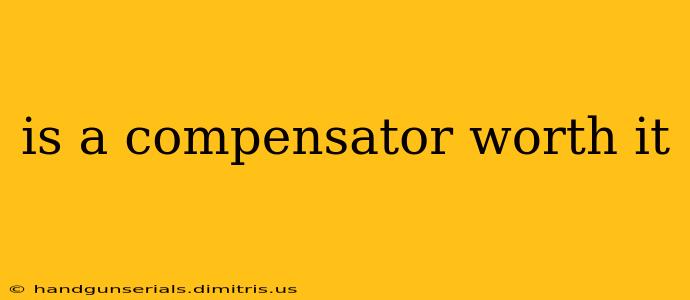Choosing the right accessories for your firearm can significantly impact its performance and your shooting experience. One popular addition is the compensator, a muzzle device designed to reduce recoil and muzzle rise. But is a compensator worth the investment? The answer, as with most firearm modifications, depends on your individual needs and shooting style. This comprehensive guide will explore the pros and cons to help you decide.
What is a Compensator?
A compensator is a muzzle device attached to the end of a firearm barrel. Unlike a suppressor (which reduces sound), a compensator primarily focuses on managing recoil and muzzle rise. It achieves this by redirecting propellant gases escaping the barrel, counteracting the upward and backward forces generated during firing. This leads to improved shot-to-shot follow-up, faster target reacquisition, and potentially greater accuracy, especially in rapid-fire situations.
The Advantages of Using a Compensator
Several key benefits make a compensator a worthwhile addition for many shooters:
1. Reduced Recoil and Muzzle Rise:
This is the primary function and arguably the biggest advantage. By cleverly redirecting gases, the compensator significantly reduces the felt recoil and the amount the muzzle jumps upward after each shot. This is particularly beneficial for shooters who struggle with recoil management, or those engaging in rapid fire.
2. Improved Accuracy and Faster Follow-Up Shots:
The reduced recoil and muzzle rise translate directly into improved accuracy. Your sights stay on target longer, allowing for quicker and more precise follow-up shots. This is crucial in competitive shooting, self-defense scenarios, and hunting situations where quick target reacquisition is essential.
3. Enhanced Controllability:
With less recoil and muzzle jump, you'll have greater control over your firearm, especially during rapid firing sequences. This increased control leads to improved accuracy and a more consistent shooting experience.
The Disadvantages of Using a Compensator
While the benefits are significant, there are some downsides to consider:
1. Increased Noise:
While not as significant as the increase with a suppressor, compensators can slightly increase the perceived noise of the firearm. The redirection of gases can create a sharper, more noticeable report.
2. Potential for Gas Blowback:
Depending on the design and your shooting position, some gas can be redirected toward the shooter. This can cause discomfort or even damage to skin and eyes, though this effect is usually minimal with proper design and use.
3. Weight and Size Addition:
Compensators add weight and length to your firearm. This might be a factor for shooters who prefer lighter and more compact weapons. The added length can also affect how the firearm handles in close-quarters situations.
4. Potential for Legal Restrictions:
In some jurisdictions, there are regulations regarding the use of compensators. Always check local and state laws before installing one on your firearm.
Is a Compensator Right for You?
The decision of whether or not to use a compensator depends on several factors:
- Type of shooting: Competitive shooters, those practicing rapid fire drills, and hunters often benefit greatly from a compensator. Casual target shooters might find it less necessary.
- Caliber of firearm: The effectiveness of a compensator is influenced by the caliber. Larger calibers generally experience more recoil, making a compensator more beneficial.
- Personal preference: Ultimately, the best way to know if a compensator is right for you is to try one. If possible, rent a firearm with a compensator to experience the difference firsthand.
Conclusion
A compensator can be a valuable addition to a firearm, particularly for shooters who prioritize recoil reduction, improved accuracy, and faster target reacquisition. However, it's essential to weigh the potential disadvantages and consider your individual needs and shooting style before making a purchase. Research different compensator designs, consider your budget, and always prioritize safety. Remember to always check your local laws and regulations before installing any modifications to your firearm.

